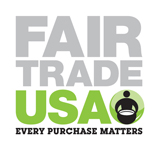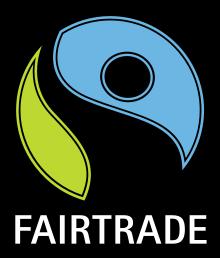
Fair trade is an arrangement designed to help producers in growing countries achieve sustainable and equitable trade relationships. Members of the fair trade movement add the payment of higher prices to exporters, as well as improved social and environmental standards. The movement focuses in particular on commodities, or products that are typically exported from developing countries to developed countries, but is also used in domestic markets, most notably for handicrafts, coffee, cocoa, wine, sugar, fruit, flowers, and gold.

The Fairtrade Foundation is a charity based in the United Kingdom that works to empower disadvantaged producers in developing countries by tackling injustice in conventional trade, in particular by promoting and licensing the Fairtrade Mark, a guarantee that products retailed in the UK have been produced in accordance with internationally agreed Fairtrade standards. The Foundation is the British member of FLO International, which unites FLO-CERT, 25 National Fairtrade Organisations and 3 Producer Networks across Europe, Asia, Latin America, North America, Africa, Australia and New Zealand.

Oxfam Australia is an Australian, independent, not-for-profit, secular, community-based aid and development organization, and is an affiliate of the Oxfam International confederation. Oxfam Australia's work is divided into four broad categories covering Climate Justice, Economic Justice, Gender Justice and First Peoples Justice as well as Humanitarian response. They believe that poverty in the 21st century is less a problem of scarcity but the result of how resources, opportunities, and protections are distributed and wielded.

The International Fairtrade Certification Mark is an independent certification mark used in over 50 countries. It appears on products as an independent guarantee that a product has been produced according to Fairtrade political standards.

Fair Trade USA, formerly "TransFair USA", is a 501(c)(3) non-profit organization that sets standards, certifies, and labels products that promote sustainable livelihoods for farmers and workers and protect the environment.

Fairtrade Canada, formerly TransFair Canada, is a national non-profit certification and public education organization promoting Fairtrade certified products in Canada to improve the livelihood of developing world farmers and workers. It is the Canadian member of FLO International, which unites 24 fair trade producer and certification initiatives across Europe, Asia, Latin America, North America, Africa, Australia and New Zealand.

The Fair Trade Association of Australia and New Zealand is a member-based organization that supports two systems of fair trade. The first is the Australia and New Zealand member of FLO International, which unites Fairtrade producer and labeling initiatives across Europe, Asia, Latin America, North America, Africa, Australia and New Zealand. The second, is the World Fair Trade Organization (WFTO), of over 450 worldwide members, to which the Fair Trade Association is one. Fairtrade refers to FLO certified commodity and associated products. Fair trade encompasses the wider Fair Trade movement, including the Fairtrade commodities and other artisan craft products.
The fair trade movement has undergone several important changes like the operation for ten thousand villages to open their businesses since early days following World War II. Fair trade, first seen as a form of charity advocated by religious organizations, has radically changed in structure, philosophy and approach. The past fifty years have witnessed massive changes in the diversity of fair trade proponents, the products traded and their distribution networks.
The fair trade debate is a debate surrounding the ethics and alleged economic implications of fair trade as well as alleged issues with the Fairtrade brand. Some criticisms have been raised about fair trade systems. One 2015 study in a journal published by the MIT Press concluded that producer benefits were close to zero because there was an oversupply of certification, and only a fraction of produce classified as Fair Trade was actually sold on Fair Trade markets, just enough to recoup the costs of certification. A study published by the Journal of Economic Perspecitives however suggests that Fair Trade does achieve many of its intended goals, although on a comparatively modest scale relative to the size of national economies. Some research indicates that the implementation of certain fair trade standards can cause greater inequalities in some markets where these rigid rules are inappropriate for the specific market. In the fair trade debate, there are complaints of failure to enforce the fair trade standards, with producers, cooperatives, importers and packers profiting by evading them.
Shared Interest Society Limited is a fair trade financial co-operative based in the United Kingdom formed in 1990. Today it provides credit and financial services to fair trade producers, retailers, importers and exporters throughout the world. Shared Interest works with both Fairtrade International and the World Fair Trade Organization (WFTO). In 2004, the Shared Interest Foundation was formed as a charitable subsidiary, providing training and support services to producers, complementing the financial services offered by the Society. Shared Interest received the Queen's Award for Enterprise in 2008.

Oxfam is a British founded confederation of 21 independent charitable organizations focusing on the alleviation of global poverty, founded in 1942 and led by Oxfam International.

Fair trade coffee is coffee that is certified as having been produced to fair trade standards by fair trade organizations, which create trading partnerships that are based on dialogue, transparency and respect, with the goal of achieving greater equity in international trade. These partnerships contribute to sustainable development by offering better trading conditions to coffee bean farmers. Fair trade organizations support producers and sustainable environmental farming practices and prohibit child labor or physical forced labor.

A fair trade certification is a product certification within the market-based movement fair trade. The most widely used fair trade certification is FLO International's, the International Fairtrade Certification Mark, used in Europe, Africa, Asia, Australia and New Zealand. Fair Trade Certified Mark is the North American equivalent of the International Fairtrade Certification Mark. As of January 2011, there were over 1000 companies certified to the FLO International's certification and a further 1000 or so certified to other ethical and fairtrade certification schemes around the world.

Coffee production in Ethiopia is a longstanding tradition which dates back dozens of centuries. Ethiopia is where Coffea arabica, the coffee plant, originates. The plant is now grown in various parts of the world; Ethiopia itself accounts for around 3% of the global coffee market. Coffee is important to the economy of Ethiopia; around 60% of foreign income comes from coffee, with an estimated 15 million of the population relying on some aspect of coffee production for their livelihood. In 2006, coffee exports brought in $350 million, equivalent to 34% of that year's total exports.

The Union of Indigenous Communities of the Isthmus Region, is a farmer's cooperative in the state of Oaxaca, Mexico. It was established in 1982 to assist in production, marketing and distribution of locally produced coffee and other products. UCIRI was a pioneer of organic coffee production and one of the first fair trade suppliers.
International Resources for Fairer Trade (IRFT) is a non-profit organisation registered as a Public Charitable Trust under the Bombay Public Charitable Trust Act. It was founded by Kirit Dave and Jan Simmonds in October 1995. Vinita Singh was the first Director of IRFT during the period 1996-2002 and tied up with DFID, and Traidcraft. Arun Raste succeeded her as the Director in IRFT and was heading the organisation till 2008, during which time IRFT opened 2nd office in Hyderabad and forged partnership with Hivos, BTC and Oxfam. During the tenure of Arun Raste, IRFT also forged partnerships with SAI, FLO, Better Cotton Initiative and FLA.
The Cooperation for Fair Trade in Africa (COFTA) is an organized social movement that aims to eliminate poverty through the fair distribution of profits during international trade.

A cooperative ("co-op") is an autonomous association of persons who voluntarily cooperate for their mutual, social, economic, and cultural benefit through a mutually owned and democratically run enterprise. Cooperatives include non-profit community organizations and businesses that are owned and managed by the people who use their services or by the people who work there and take on a variety of forms, ranging from officially registered cooperatives to loosely organized groups of neighbors, family, and kin networks. Cooperatives are based on values like self-help, democracy, equality, equity, and solidarity. These values, among other aspects of cooperatives, are particularly useful in empowering women through membership. In statements in advance of International Women's Day in early 2013, President of the International Cooperative Alliance, Dame Pauline Green, said, "Cooperative businesses have done so much to help women onto the ladder of economic activity. With that comes community respect, political legitimacy and influence." Cooperatives allow women who might have been isolated and working individually to band together and create economies of scale as well as increase their own bargaining power in the market.
An alternative purchase network (APN) is a contemporary commerce channel established as an alternative to perceived consumerism, and the cultural and economic hegemony of the global market. Alternative purchase networks aim to promote ethical shopping behaviour, which has an environmentally-friendly approach and considers local realities.
Fair trade is where a farmer or craftsperson is paid a fair price for their product, one that represents its true worth, not just the lowest price that it is possible to pay. This is a price that covers the cost of production and enables the producer to live with dignity. Fair Trade New Zealand is an organisation that was launched in 2005 which supports fair trade by ensuring that farmers and workers' rights are not exploited. According to Oxfam New Zealand, there are several companies to support fairly traded goods from, which are exported to New Zealand. From 2013-2014 there were 42 Fair Trade Licensees and Traders in New Zealand. From 2015-2016 this number rose to 54 Fair Trade Licensees and Traders in New Zealand. Gwen Green, Oxfam's Engagement Director, says: "when farmers are paid fairly for their products, we see people able to make real improvements to their lives and their communities. Producers who used to struggle to feed their families are able to give their children an education, and communities can build schools and develop businesses. It is one of the smart solutions to poverty". In 2009, Wellington became the first fair trade capital city in the Southern Hemisphere. In 2017, Whangarei was recognised by the Fair Trade Association of Australia New Zealand as being one of four fair trade councils in New Zealand, and the first fair trade district in New Zealand.
 EZA Fairer Handel
EZA Fairer Handel  Oxfam-Magasins Du Monde
Oxfam-Magasins Du Monde  Oxfam-Wereldwinkels
Oxfam-Wereldwinkels  Equita
Equita  La Siembra Cooperative
La Siembra Cooperative  Plan Nagua
Plan Nagua  Just Us! Coffee Roasters Co-Op
Just Us! Coffee Roasters Co-Op  Alter Eco
Alter Eco  Éthiquable
Éthiquable  Lobodis
Lobodis  Solidar'Monde
Solidar'Monde  Artisans du Monde
Artisans du Monde 
 Veja Sneakers
Veja Sneakers  Gepa The Fair Trade Company
Gepa The Fair Trade Company  Ethiquable Deutschland
Ethiquable Deutschland  El Puente
El Puente  CTM Altromercato
CTM Altromercato  AgroFair
AgroFair Fair Trade Original
Fair Trade Original  Alternativa3
Alternativa3  Ideas
Ideas  Intermon Oxfam
Intermon Oxfam  Claro Fair Trade
Claro Fair Trade  Siem Fair Trade Fashion
Siem Fair Trade Fashion  Cafédirect
Cafédirect  Equal Exchange Trading
Equal Exchange Trading  Traidcraft
Traidcraft  Oxfam Trading
Oxfam Trading  Twin Trading
Twin Trading 
 Divine Chocolate
Divine Chocolate 
 Cooperative Coffees
Cooperative Coffees  Ten Thousand Villages
Ten Thousand Villages  Equal Exchange
Equal Exchange  SERRV International
SERRV International 











